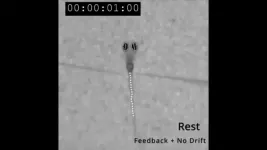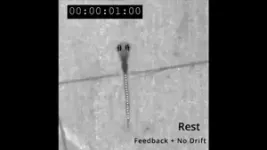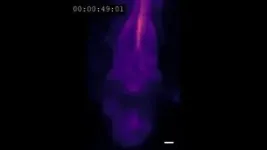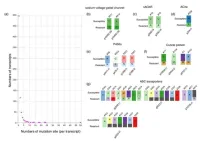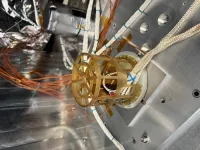(Press-News.org) The decades-old anesthetic ketamine could be a game changer for treating severe depression, but there are still many questions about how the drug works, including exactly how it affects the brain’s cells and circuits.
To help answer these questions, researchers are turning to an unlikely animal: tiny, days-old zebrafish.
The millimeters-long, translucent zebrafish may not get depressed exactly like humans do, but the fish do exhibit a “giving up” behavior: they stop swimming after they realize they aren’t getting anywhere – a passive behavior that scientists use to study depression in animals.
By taking advantage of this behavior, the ability to image the zebrafish’s entire brain, and a unique virtual reality system, a team of researchers from HHMI's Janelia Research Campus, Harvard, and Johns Hopkins found where ketamine acts in the zebrafish brain: at supporting cells called astroglia, rather than neurons.
Previous research by Janelia scientists found that astroglia act as a counter that tells the fish when to give up. As the fish registers that it isn’t getting anywhere, it swims harder, and astroglia activity ramps up. When astroglia activity reaches a threshold, the cells signal to neurons for the fish to stop swimming.
The new research finds that a brief exposure to ketamine causes a lasting suppression of the “giving up” behavior by overstimulating astroglia. This overstimulation, which occurs through ketamine’s stimulation of noradrenergic neurons that activate astrocytes, appears to subsequently reduce the astroglia counter’s sensitivity, causing the fish to continue swimming normally, even when it isn’t getting anywhere.
“Our paper suggests that these astroglia, this non-neuronal cell population, are playing a very important role, and that some of the key effects of these antidepressant compounds go through changes in astroglial physiology,” says Alex Chen, a joint PhD student in the Ahrens Lab at Janelia and the Engert Lab at Harvard and a co-lead author on the paper.
The team’s findings, which also show that astrocytes are similarly activated in mice, could help researchers get a clearer picture of how antidepressants work in the brain, potentially leading to the development of safer and more effective drugs to treat depression. Understanding how antidepressants work on a molecular level has confounded scientists for decades, with much of their work focused on the drugs’ effects on neurons.
“I think our research suggests that targeting these astrocytes to find new treatments could be an interesting way to go,” says Marc Duque Ramírez, a PhD student in the Engert Lab and a co-lead author on the paper.
Using zebrafish to test ketamine
The project started when the team, led by Duque and Chen, wanted to see if they could use zebrafish to test antidepressants that were known to work in humans and had previously been tested in rodents. Because zebrafish are small and translucent, researchers can image each animal’s entire brain to better track the drug’s effects.
The Ahrens Lab had shown in earlier work that zebrafish exhibit a trait known as futility-induced passivity, or “giving up” – a behavior that has also been seen in rodents. Using a virtual reality setup, the researchers fixed the fish in place and showed them different visual patterns. When the fish saw a pattern simulating backward motion, they wiggled their tails as though swimming forward. When the pattern changed to one simulating being stuck in place, the animals would struggle at first, then give up, become passive, and stop swimming.
In the new work, the researchers show that ketamine suppressed this giving up behavior for over a day. Although the fish still struggled when their swimming was not effective, they did not give up as easily and were less passive.
The authors also tested other fast-acting antidepressants, such as psychedelic compounds, and found a reduction in passivity like they saw with ketamine. On the other hand, stress-inducing treatments, such as chronic glucocorticoids, increased the giving up behavior.
Imaging reveals action on astroglia
Next, the team turned their attention to what the drug was doing in the fish’s brain. Previous research by the Ahrens Lab found the giving up action is associated with a type of glial cell called radial astrocytes.
Whole-brain imaging revealed that ketamine increased the amount of calcium at the astrocytes, showing that the drug activated these cells for many minutes after administration. The researchers think that although short or fast increases in astroglia calcium might drive giving up behavior, the aftereffects of the ketamine-induced flood of calcium reduce the astroglia’s response to the futility signal that drives giving up behavior, making the fish more robust in these behavioral situations, or less likely to give up, in the future.
“It’s desensitized because during ketamine it was so hyperactivated,” says Janelia Senior Group Leader Misha Ahrens, a senior author on the paper. “It’s like when you take a cold shower – afterwards you are a little less sensitive to the cold – but at a cellular and molecular level.”
The researchers also found that this same mechanism was at work in mammals. Eric Hsu, a graduate student at Johns Hopkins and a co-lead author on the paper, found that astrocytes were similarly activated in mice, both when they exhibit “giving up” behavior and when they are exposed to ketamine.
“This evidence of cross-species conservation increases the likelihood that comparable mechanisms exist in humans,” says Dwight Bergles, a professor of neuroscience at Johns Hopkins and a senior author on the paper.
The team’s study demonstrates that ketamine is acting on the astrocytes by increasing norepinephrine levels, though how it does that and how that changes neuronal and astroglia physiology as a result is still unknown. But the findings do point to a potential role for astroglia in depression and could help inform future research.
“We need to be careful in taking these results too literally, but this could be a model for pieces of the mammalian brain,” Ahrens says.
END
Discouraged zebrafish help reveal how ketamine works in the brain
2024-12-17
ELSE PRESS RELEASES FROM THIS DATE:
Daily physical activity, sports participation, and executive function in children
2024-12-17
About The Study: In this cohort study of Dutch children, early-life moderate to vigorous physical activity was not associated with executive function in middle childhood. Children participating in team sports at ages 10 to 11 consistently exhibited superior executive function compared with participants in individual sports.
Corresponding Author: To contact the corresponding author, Lu Yang, MSc, email l.yang@umcg.nl.
To access the embargoed study: Visit our For The Media website at this link https://media.jamanetwork.com/
(doi:10.1001/jamanetworkopen.2024.49879)
Editor’s Note: Please see ...
Biased language in clinical handoffs may negatively impact patient care
2024-12-17
When doctors and nurses pass patient information from one shift to another — an exchange known as a “handoff” — the specific words they use behind closed doors matter more than they might realize. A new study published in JAMA Network Open shows that when clinicians hear a patient described with negatively biased language, they develop less empathy towards the patient and, in some cases, become less accurate in recalling the patient’s critical health details. Such shifts in perception may be subtle and unintentional in many cases, but as these hidden biases stack up, they can influence the care patients ultimately receive.
“A lot is going on here ...
Young English speakers are most comfortable with digital health
2024-12-17
Study shows how language, education and age affect someone’s ability to engage with digital health tools.
Digital health tools, such as patient portals, treatment apps and online appointment schedulers, are increasingly common. But not everyone is equally at home using them.
To find out how language, education and age may affect a person’s comfort in using digital tools, UC San Francisco researchers surveyed caregivers of hospitalized children at UCSF Benioff Children’s Hospitals.
The researchers found that being a Spanish speaker, having less education, and being older all made people feel less comfortable with digital health ...
Study maps bed bugs’ genomes in unprecedented detail to find out why they just won’t die
2024-12-17
Scientists mapped near-gap-free and near-error-free genomes of a susceptible bed bug strain and a superstrain around 20,000 times more insecticide-resistant, offering the broadest look yet at the full scope of their resistance mutations.
Their findings were published in the journal Insects.
Although there is no evidence that bed bugs transmit diseases to humans, their bites can cause itchy rashes and secondary skin infections. Widespread use of insecticides, including the now-banned DDT, nearly wiped out populations of these blood-sucking insects by the 1960s, making infestations ...
SwRI awarded $26 million to develop NOAA magnetometers
2024-12-17
SAN ANTONIO — December 17, 2024 —NASA and the National Oceanic and Atmospheric Administration (NOAA) recently awarded Southwest Research Institute a $26 million contract to develop magnetometers for NOAA’s Space Weather Next (SW Next) program for two missions to be launched in 2029 and 2032. The magnetometers will measure the interplanetary magnetic field carried by the solar wind.
“The instruments provide critical data to NOAA’s Space Weather Prediction Center which issues forecasts, warnings and alerts that help mitigate space weather impacts,” said Dr. Roy Torbert, a program director in SwRI’s Earth, Oceans, and Space office ...
Being digitally hyperconnected causes ‘techno-strain’ for employees
2024-12-17
A new study has shown that employees are experiencing mental and physical techno-strain due to being ‘hyperconnected’ to digital technology making it difficult for people to switch off from work.
Researchers from the University of Nottingham’s Schools of Psychology and Medicine conducted detailed interviews with employees from a range of professions and found that the cognitive and affective effort associated with constant connectivity and high work pace driven by the digital workplace is detrimental to employee wellbeing. The results have been published today in Frontiers in Organizational Psychology.
This new paper is the final part of a research ...
Missing rebound: Youth drug use defies expectations, continues historic decline
2024-12-17
Image
Adolescent drug use continued to drop in 2024, building on and extending the historically large decreases that occurred during the pandemic onset in 2020.
"I expected adolescent drug use would rebound at least partially after the large declines that took place during the pandemic onset in 2020, which were among the largest ever recorded," said Richard Miech, team lead of the Monitoring the Future study at U-M's Institute for Social Research.
"Many experts in the field had anticipated that drug use would resurge ...
Announcing the 2024 Mcknight Brain Research Foundation Innovator Awards in Cognitive Aging and Memory Loss
2024-12-17
NEW YORK CITY and ORLANDO— The American Federation for Aging Research (AFAR) and the McKnight Brain Research Foundation (MBRF) are pleased to announce the 2024 recipients of The McKnight Brain Research Foundation Innovator Awards in Cognitive Aging and Memory Loss: Janine Kwapis, PhD, of Pennsylvania State University, and Sanaz Sedaghat, PhD, of the University of Minnesota.
Now in its fourth year, the Innovator Awards provide funding to research scientists pursuing groundbreaking studies in the field of cognitive aging.
Janine Kwapis, PhD, is an Assistant Professor and Paul Berg Early Career Professor ...
Study shows drop in use of antiviral medications in young children with influenza
2024-12-17
Despite national medical guidelines supporting the use of antiviral medications in young children diagnosed with influenza, a recent study reports an underuse of the treatment.
“Antiviral Use Among Children Hospitalized with Laboratory-Confirmed Influenza Illness: A Prospective, Multicenter Surveillance Study” was published in Clinical Infectious Diseases, the flagship journal of the Infectious Diseases Society of America.
Flu illness accounts for up to 10% of all pediatric hospitalizations during ...
Generative AI against diseases: Insilico Medicine announced Pharma.AI-powered HPK1 inhibitor series in peer-reviewed publication trilogy, as potential immunotherapy options
2024-12-17
Hematopoietic progenitor kinase 1 (HPK1), a member of the Ste20 serine/threonine kinases family, negatively regulates T cell function and is considered a promising target for immunotherapy. Despite the promising efficacy demonstrated in preclinical models, no HPK1 inhibitors are currently approved for clinical use, due to challenges including balance between kinase selectivity and pharmacokinetic properties.
CAMBRIDGE, Mass., Dec 17, 2024 --- Insilico Medicine (“Insilico”), a clinical-stage generative artificial intelligence (AI)-driven drug discovery company, is proud to announce its latest AI-powered ...
